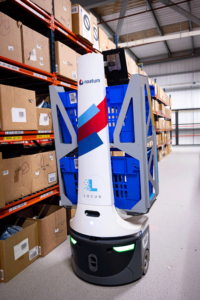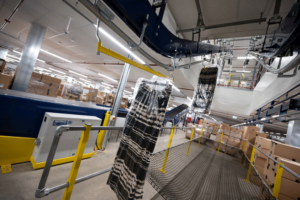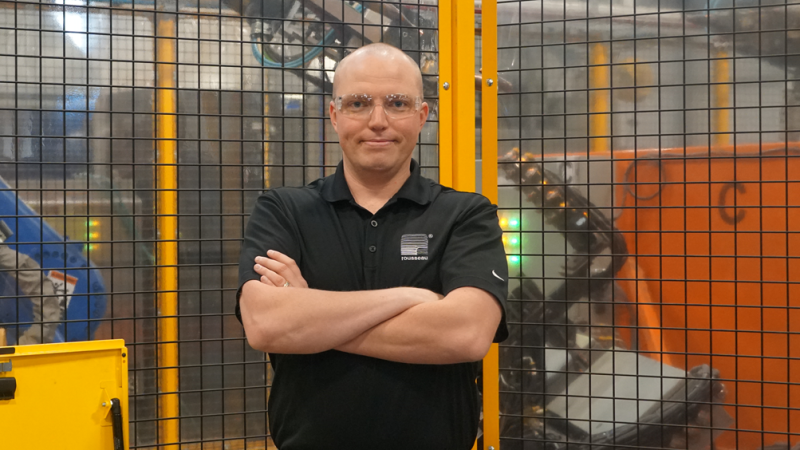Noatum Logistics is one of the top 50 freight forwarders in the world, employs 2,600 specialised professionals and is part of the maritime logistics and port services company, Noatum Marine as a leading supply chain 3PL supplier. The firm provides international transport, project shipment, logistics and customs brokerages across 28 countries, providing a total, omnichannel, end-to-end solution.
Noatum Logistics operates globally while dealing with supplier’s vendors on a local level, keeping orders on track and managing pick-ups from their suppliers.
The last time we spoke with Noatum Logistics UK’s Commercial Director, Steve Hicks, the company was undergoing an impressive period of growth following the recovery from the Covid pandemic. Part of that growth was the construction of the ePoint warehouse, an enormous facility in London Medway completed within a seven-month window. Hicks told us about fitting conveyors, having warehouse management systems designed and installed, and bringing the warehouse live. The warehouse’s proximity to London and its eCommerce capabilities put it in high demand.
Since then, the work has not stopped.
“What’s happened since then is that the ePoint warehouse is oversubscribed and spoken for now,” Hicks updates us. “Last year we started the process of opening a new warehouse again with mezzanine floors and creating 530,000 square feet of space. It is a large set-up, and it is due to go live in September, but 75% of the space has already been sold. It has been a booming period for the business.”
The demand for this warehouse was primarily driven by an e-commerce customer who wanted to have its retail and wholesale businesses based within the UK.
“This was partly driven by Brexit,” and growth plans Hicks explains. “Like a lot of companies, they want the stock in the country rather than elsewhere in the world and having to go through customs to get here.”
 Rise of the Robots
Rise of the Robots
This is only one facet of a story of growth. Noatum Logistics UK has grown by 25% with 1 million sq. ft of new warehousing space over the last year, and Noatum is continuing to invest another £20 million in its site at Biggleswade. But with that growth come challenges, particularly in the current economic environment, as Hicks is the first to point out.
“The labour market continues to be challenging, and so in our London Medway site we have been trialling Locus Robotics,” Hicks tells us. “At our new Biggleswade site we are putting 60 of these robots onto the site. Automation is becoming much more relevant in the warehouse sector.”
Introducing automated solutions into a labour-intensive sector can bring its own challenges, however, depending on how staff feel about their new robotic coworkers. When Noatum introduced the new automated pick-and-put-away assistants, there was understandably some concern at first.
“When we first showed them to staff there were concerns that these machines would be taking their jobs, but now they have started to work with them they can see the advantages,” Hicks says. “It is taking away all the walking they used to do have to do, leaving the staff to do the more skilled jobs in picking and putting away and packing. It is all in how you communicate it to the team and show them the benefits.”
The reception to the new tools soon warmed up once their capabilities became clear.
“We put them in our London Medway site and now others are saying ‘When are we getting them?’” Hicks says. “When they see the advantage to themselves it really brings it to life.”
A Demanding Market
The way things are changing, those staff will need all the support they can get, automated or not.
“You do require staff to be flexible. It is becoming a seven-day-a-week operation,” Hicks tells us. “It’s a question of working with the staff to create a situation that is best for them as well as for the company.”
The issue, Hicks explains, is that as the e-commerce market is growing, its demands are growing with it.
“The e-commerce market is pushing everything further. They want later pick-up times for next-day delivery, and hours are getting longer,” Hicks says. “Robots help with that because they don’t just work one shift and they aren’t too worried about when they go home.”
As far as Hicks is concerned, demand is only set to grow, with the requirements set to grow more intense as customers expect more.
“I think this trend will continue. We have competitors who offer very late pick-ups and next-day deliveries, seven-day-a-week deliveries, with later cut-off times,” explains Hicks. “Customers are starting to expect to order by five and get the package the next day. At the same time, many e-commerce providers are also offering free returns, which creates its own warehousing challenges. We need to adapt and respond.”
 Noatum Logistics’ way of adapting and responding is to grow its capabilities, through its staff, how it equips those staff, and expanding its facilities.
Noatum Logistics’ way of adapting and responding is to grow its capabilities, through its staff, how it equips those staff, and expanding its facilities.
“Our next step is that we have got some spare space in our Biggleswade facility, but we are also already thinking about opening a third new warehouse in 2025,” Hicks says. “I suspect this will again be a lot more automated. That is the trend and our vision.”
As demand grows, Hicks is looking to grow the business. This means new equipment, new facilities, and new staff, but it also means seeking out new customers that can partner with Noatum during this growth.
“With warehousing, you need to find a launch customer. It is costly to start up a new warehouse, so they really help to lay the foundations,” Hicks points out. “We are always on the lookout for a new customer.”
In seeking out that new customer, Noatum’s longstanding existing customer relationships are a valuable resource.
“Sometimes existing customers have other brands associated by Group,” Hicks tells us. “A lot of our business is done by word of mouth. It is all about doing a good job, creating the right environment, and having the infrastructure to support our customers’ business.”







